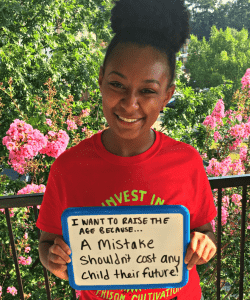By Samone Oates-Bullock
 [Editor’s Note: This blog post is by Samone Oates-Bullock, a rising senior at UNC-Chapel Hill and summer intern at NC Child. NC Child is dedicated to providing young leaders like Samone with the opportunity to develop their skills and knowledge with summer internships. We are grateful to Samone for her great work and to the Blue Cross Blue Shield Foundation and Z. Smith Reynolds Foundation for sponsoring her internship.]
[Editor’s Note: This blog post is by Samone Oates-Bullock, a rising senior at UNC-Chapel Hill and summer intern at NC Child. NC Child is dedicated to providing young leaders like Samone with the opportunity to develop their skills and knowledge with summer internships. We are grateful to Samone for her great work and to the Blue Cross Blue Shield Foundation and Z. Smith Reynolds Foundation for sponsoring her internship.]
North Carolina is a state of many firsts. The first to have Cheerwine, Krispy Kreme Doughnuts, Pepsi-Cola products and even the first in flight. With so many firsts, it’s hard to believe that North Carolina is one of the LAST to raise the age of juvenile court jurisdiction.
Shamefully, North Carolina remains one of two states left in the country that automatically prosecute 16- and 17-year-olds as adults in court, regardless of the crime. This policy is ineffective on a number of fronts. Youth with a criminal record face barriers to education, housing, voting and employment, all of which affect a person’s social mobility and quality of life. Furthermore, youth who go through the adult system are re-arrested and re-convicted at higher rates than youth in the juvenile justice system. Focusing on age-appropriate treatment and rehabilitation is the right thing for our youth.
The good news is that some of our state leaders are starting to take notice. Chief Justice Mark Martin’s Commission on the Administration of Law and Justice has included raising the age in its draft recommendations. Additionally, David Guice, Commissioner of Adult Prisons and Juvenile Justice, recently called on legislators to raise the age in an op-ed in the News and Observer.
There are several reasons why raising the age makes dollars and sense:
- Raising The Age Means Saving Money: The most thorough and recent cost benefit analysis conducted on raising the age by the Vera Institute of Justice clearly states that raising the age would generate $52.3 million in benefits every year from the combined perspective of taxpayers, youth and victims compared to an annual cost of $49.2 million. Youth handled in the juvenile system return to the system at lower rates than youth handled in the adult system, which means more public savings and higher tax revenue. So no, it’s not a matter of instant gratification but the long-term benefits greatly outweigh the short-term costs.
- The Juvenile System Is Better Suited And Stricter On Our Youth Than The Adult System. The majority of 16-17 year old youth are first time offenders (67 percent). Of those 16- and 17-year-olds, 79 percent are accused of misdemeanors, 18 percent are accused of low-level felonies (Class F-I) and only 3 percent are accused of serious felonies (Class A-E). Due to the fact that most youth in the adult system are first time offenders, they typically receive community supervision. Unlike the juvenile system which is much tougher on youth, as it has many more requirements and restrictions on youth.
- The Racial Disparities In North Carolina’s Criminal Justice System Are Very Clear. African-American youth are 62 percent of the youth prosecuted in the adult system and are nine times more likely than white youth to receive an adult prison sentence. In addition, African-American students are more likely to come into contact with the criminal justice system because of the School-To-Prison Pipeline. A recent study in Wake County also showed that if a Black student is accused of theft, he or she is 1.7 times more likely to be arrested than other students accused of theft. In 2014-15 African-American students made up 26 percent of the NC public school demographic but accounted for 56.6 percent of in-school suspensions, 55.4 percent of long-term suspensions and 73.8 percent of school expulsions. The significantly high rate of suspensions/expulsions decreases students in class time and increases their chances of being arrested for a school-based offense. People of color are greatly impacted by the negative effects of the criminal justice system and we have to start paying more attention to that.
It’s time for North Carolina to “Raise The Age” already. There’s no question that removing 16- and 17-year-olds from the adult system will not only benefit our youth, but taxpayers and government as well. If raising the age makes sense in 48 other states, it should also make sense in North Carolina.
Looking for a way to get involved with “Raise The Age NC”?
- Follow us on Twitter: @RaiseTheAge_NC
- Like us on Facebook: Raise the Age North Carolina
- Attend one of the NCCALJ public hearings and express your concerns!
- Participate in our ongoing social media campaign. All you have to do is use the hashtag “#IWantToRaiseTheAgeBecause___” and fill in the blank with your own story.
- Sign the Raise The Age NC petition!
- Contact your state legislators to voice your support for raising the age.
More about the author:
I’m Samone Oates-Bullock, a rising senior at the University of North Carolina at Chapel Hill. I’ve had the wonderful opportunity to intern with NC Child this summer. It’s been my distinct pleasure to work on advancing the “Raise the Age NC” campaign and to continue the work of Brandy Bynum, a phenomenal “Raise The Age NC” advocate. I’ve spent the summer conducting presentations throughout the state and creating a variety social media tools in order to spread the word about the “Raise the Age NC” campaign. It’s my hope that people will join in on the fight for justice because our children deserve so much better than this.
